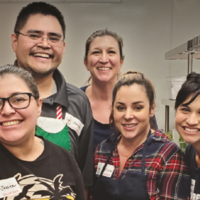
As January came to an end, so did numerous nationwide activities in recognition of the U.S.’ National Slavery and Human Trafficking Prevention Month. Although this sadly does not translate to the end of human trafficking, our fight as an anti-money laundering (AML) and financial crime prevention community is far from over.
One undeniable truth for our community of professionals is that knowledge is power and it is achieved through continuous training, education and information sharing. As proud members of the Polaris Freedom Circle, I am happy to share that in January, Polaris released a report on human trafficking in illicit massage businesses.1
Data collected for the report came from mapping and cross-referencing numerous publicly available data sets, evidence gathered by the National Human Trafficking Hotline, and Polaris’ focus groups and extensive case studies. The numbers are staggering: Polaris found more than 9,000 illicit massage businesses (IMBs) operating in the U.S. The total annual revenue of IMBs accounts for approximately $2.5 billion. More critically, the study states that, “Thousands of women are being trafficked in massage parlors in the United States on any given day.” In addition, of the 32,000 cases reported to the National Human Trafficking Hotline, 2,949 accounted for trafficking related to massage parlors, a high second only to trafficking in escort services.
Certainly, as a private citizen, I encounter numerous massage businesses in my local area and as I travel around the country. It is important to note that not all commercial sex venues are illicit nor are they human trafficking sites, even if massage services are included in their offering. Moreover, as a refresher to human trafficking 101, Polaris reminds us that force, fraud2 or coercion3 must exist for the activity to be considered human trafficking. The report also lists a few indicators of potential human trafficking at massage parlors, such as the appearance that women are living in their place of business, prices significantly below market level, and locked and buzzer-controlled entrances directing customers to enter through back or side doors that are more discreet.
Unfortunately, there is absolutely no denying the existence of IMBs. Polaris reports that in every case, at least one element of labor trafficking (not restricted to sex trafficking), fraud and coercion, are present. In addition, the report notes that force is rarely used in massage parlor trafficking.
Reading further into the report, I am reminded of the complexity of human trafficking, and that as a predicate crime to money laundering, not all IMBs are stand-alone operations. Instead, they may also be units of intricate trafficking networks. As outlined by Polaris, “The average IMB connects to at least one other IMB as well as non-massage venues such as nail salons, restaurants, grocery stores, and dry cleaners.”4 Polaris also emphasizes that, “Overwhelmingly, these connected businesses are used to launder money earned from the IMB, and these networks generally include shell companies that obscure identities of the real trafficking profiteers.”5
Naturally, as an AML/financial crime prevention professional, the words “beneficial ownership” come to mind. Polaris expands further into this topic in Section 2 of their report titled, “Unmasking Shell Companies to Reveal Business Owners,” by offering the reader insight into red flag indicators of illicit shell company behavior, such as inconsistent identification documents and funds transfer activity that is unexplained or repetitive and shows unusual patterns. These transactions may also include multiple wire transfers and high levels of automated teller machine activity. I highly recommend everyone to utilize the research offered in this section in your institution’s own beneficial ownership training programs, particularly as it relates to the organized crime element of IMBs.
As if the incredible contribution by Polaris via this latest work was not enough, Polaris embarked on a nationwide tour to educate the community at large on the IMB topic. Rochelle Keyhan, director of Polaris’ Disruption Strategies, hosted a series of screenings of the documentary Save My Seoul, followed by panel discussions with local subject-matter experts about the current realities of human trafficking in massage parlors across the U.S. According to their event site, Save My Seoul “sheds light onto the global sex industry through interviews with traffickers, civilians, police and survivors, and the discussion will pivot to human trafficking happening in your city."6 A few ACAMS employees, along with other industry and community members, attended the January 30 screening in Miami, Florida. The film included undercover footage by two very brave young men and women determined to bring this issue to the forefront and succeeded in presenting the viewer with the hidden dichotomy of a conservative family values “not my daughter” society versus the unspoken but widely known and accepted illicit sex industry. Immediately following the film, Keyhan moderated an in-depth panel discussion on the current state of affairs in South Florida. The panelists were Detective Mike Joo, of the Broward County Sheriff's Office, Tabitha Gallerani, a licensed mental health therapist that works with survivors in Broward County and Long Island, New York, and Jorge Montiel, investigator at the San Francisco Department of Public Health. South Florida is unfortunately one of the top regions for illicit massage parlors in the U.S., and the panelists reminded us of the incredible task that lies ahead of us, noting the importance of community partnerships in order to effectively eradicate these criminal enterprises.
Finally, I encourage you to add Polaris’ comprehensive Human Trafficking in Illicit Massage Businesses report as an additional resource to your institution’s training programs. This fight can only be won in cooperation with our global community partners—from continuing our work with law enforcement and nonprofit organizations to information sharing with other financial institutions.
For more information on ACAMS’ efforts in the anti-human trafficking space, feel free to contact me at tmontoya@acams.org.
Thank you for all that you do to keep our global financial systems safe! I look forward to hearing from you.
- “Human Trafficking in Illicit Massage Businesses,” Polaris, January 2018, https://polarisproject.org/sites/default/files/Full%20Report%20-%20Human%20Trafficking%20in%20Illicit%20Massage%20Businesses.pdf
- Deceitful recruitment practices, fraudulent debt accumulation
- Emotional manipulation; document confiscation; threats of law enforcement, deportation, exposure and shaming; consequences to family members
- Ibid.
- Ibid.
- Polaris’ Upcoming Events, https://polarisproject.org/communityevents










